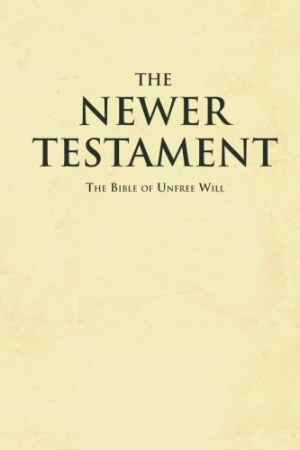The Newer Testament
The Bible of Unfree Will
The Newer Testament proposes an evolving theory that the “‘free will’ model of reality … no longer makes any logical sense.” Written by a group of people called The Masters, the volume proclaims to be the “Bible of Unfree Will.”
The book begins immediately building its thesis, seeking to convince readers that they do not have free will, and that the lack of free will is not something to be feared, but to be embraced. By letting go of the notion of free will, people can stop blaming others or themselves for their troubles. People can smile again, the book declares, knowing that nothing is their fault. This basic idea is repeated throughout in a kind of rote methodology. Unfree beings, readers learn, operate on causality and on what is called the “sweet spot” principle: each person has positive and negative qualities which, taken as a whole, determine who an individual is attracted to and who is attracted to him or her.
The sweet spot theory is an original way to view social reality. A less pleasant proposition offered in the text is a “2nd Pill,” or “end it all pill,” to be prescribed and controlled by the government. The contention is that if people knew that they had the option to take their own lives at any time, they would be less mentally disturbed and, consequently, less violent. This idea is propounded in a chapter subtitled “for madmen only.”
There are awkward sentences throughout the text, such as, “Its also about how do we receive ourselves?” But these instances are less distracting than the volume’s overall arrangement seemingly modeled after the Bible with book, chapter, and verse as the format. Each of the thirty-five “books” in The Newer Testament is supposed to have been written by one of “The Master Teachers,” with honorifics such as The Introducer, The Absorber, The Enforcer, and The Vindicator, and composed almost entirely of numbered statements by these “masters.” The authorship of the book is also attributed to “The Master Teachers,” a jejune fancy since readers can easily deduce that it was written by one person who maintains a website promoting the book, and there offers specific (though anonymous) personal details.
It is also difficult to take the volume’s claims for itself seriously. The cover blurb declares: “It has been 520 years since The New World was discovered by Christopher Columbus, and according to this groundbreaking book, its discoveries will ‘make [Columbus’s] discoveries look inconsequential by comparison.’” The introduction also states: “The Newer Testament is one of our planet’s most important new developments.”
Despite the fact that it contains a few original concepts, such grandiose assertions coupled with an inability to deliver on them seem calculated to ensure that The Newer Testament will likely find only a limited readership.
Reviewed by
Barbara Bamberger Scott
Disclosure: This article is not an endorsement, but a review. The publisher of this book provided free copies of the book and paid a small fee to have their book reviewed by a professional reviewer. Foreword Reviews and Clarion Reviews make no guarantee that the publisher will receive a positive review. Foreword Magazine, Inc. is disclosing this in accordance with the Federal Trade Commission’s 16 CFR, Part 255.

